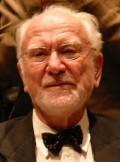
1919 - 2009 Meter: 8.7.8.7.8.7.8.5 Author of "Alma Mater" in Sing to the Lord Paul Manz (May 10, 1919 – October 28, 2009), was an American composer for choir and organ. His most famous choral work is the Advent motet "E'en So, Lord Jesus, Quickly Come", which has been performed at the Festival of Nine Lessons and Carols at King's College, Cambridge, though its broadcast by the neighbouring Choir of St John's College, Cambridge, in its Advent Carol Service precipitated its popularity.
His most famous organ works are his volumes of neo-Baroque chorale preludes and partitas. Paul Manz long served the church as recitalist, composer, teacher and leader in worship. He was Cantor Emeritus at the Evangelical Lutheran Church of Saint Luke, Chicago, Illinois; as well as Cantor Emeritus of Mount Olive Lutheran Church in Minneapolis, Minnesota. He was the director of the newly established Paul Manz Institute of Church Music, and was Professor Emeritus of Church Music at Christ Seminary Seminex at the Lutheran School of Theology at Chicago.
Paul Otto Manz was born to Otto and Hulda (Jeske) Manz in Cleveland, Ohio. Trained as an educator at Concordia Teacher's College in River Forest, Illinois (now Concordia University Chicago ) he earned a Master's Degree in Music at Northwestern University.
A Fulbright grant enabled him to study with Flor Peeters in Belgium and Helmut Walcha in Germany. The Belgian government invited him to be the official United States representative in ceremonies honoring Flor Peeters on his 80th birthday and his 60th year as titular organist of the Cathedral of Saint Rombout in Mechelen, Belgium. At that time, Flor Peeters referred to his former student as ‘my spiritual son.’
Paul Manz concertized extensively in North America. He appeared at Lincoln Center in New York City, with the National Symphony Orchestra, under conductor Geoffrey Simon, at the Kennedy Center in Washington, D.C., with the Chicago Symphony Orchestra at Orchestra Hall and with the Minnesota Orchestra under the direction of Charles Dutoit, Leonard Slatkin, and Henry Charles Smith. In addition, he played recitals in churches and cathedrals here and abroad. He was in great demand for his hymn festivals, which are his legacy as a church musician. He conducted many organ clinics, participated in liturgical seminars and appeared as lecturer and recitalist at the regional and national conventions of the American Guild of Organists.
The esteem and respect with which Paul Manz is regarded can be seen in the many honors he received. He was twice named one of the “Ten Most Influential Lutherans,” served as National Councilor of the American Guild of Organists and is listed as one of the “101 Most Notable Organists of the 20th Century.”[6] He was the recipient of many honorary doctorates and awards. Northwestern University, his alma mater, presented him with the prestigious “Alumni Merit Award;.” The Lutheran School of Theology at Chicago presented him with the distinguished "Confessor of Christ Award"; The Chicago Bible Society presented him with the “Gutenberg Award; and the Lutheran Institute of Washington, DC honored him with the first “Wittenberg Arts Award.” At a convention of the Association of Lutheran Church Musicians, his colleagues honored him for his work in the church. A large gathering in Minneapolis, Minnesota held a “Paul Manz Celebration: Honoring the Life of a Church Musician” where substantial gifts were given to the Ruth and Paul Manz Scholarship for Church Musicians.
Trinity Seminary of Columbus, Ohio bestowed the “Joseph Sittler Award for Theological Leadership” and among his many honorary doctorates is the Doctor of Sacred Music degree from Valparaiso University, and most recently, the Doctor of Music degree from St. Olaf College, Northfield, Minnesota.
As a performer, Manz was most famous for his celebrated hymn festivals. Instead of playing traditional organ recitals, Manz would generally lead a "festival" of hymns from the organ, in which he introduced each hymn with one of his famously creative organ improvisations based on the hymn tune in question. The congregation would then sing the hymn with his accompaniment. Sometimes he would play an improvisation between each sung stanza, as with his well-known variations on the tune, St. Anne, sung to the Isaac Watts text "Oh God, Our Help in Ages Past" with which he would traditionally end each festival. Many volumes of these improvisations have been written out and published and are played by church organists throughout the world.
His musical compositions are internationally known. His organ works are extensively used in worship services, recitals and in teaching. His choral music is widely used by church and college choirs here and abroad. His motet, "E’en So, Lord Jesus, Quickly Come" is regarded as a classic and has been frequently recorded. His life and works are the subject of a doctoral dissertation which details his career spanning more than fifty years and analyzes his organ works.
--en.wikipedia.org
Paul Manz
